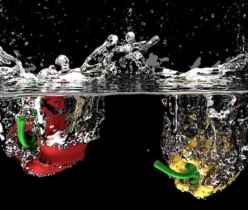1. Vitamin D
Vitamin D helps your body absorb calcium for stronger bones. Calcium can build strong bones and muscles and increase muscle mass. Vitamin D may help decrease your risk of osteoporosis (weak bones) later in life. According to the American Academy of Pediatrics, vitamin D is recommended daily intake for children ages 9 months through 4 years old. However, research shows that this level of intake is not enough for older teens. Teen girls need about 15 micrograms per day and boys should get 20 mcg/day. You can find out if you are deficient in vitamin D from your doctor or a lab test.
2. Zinc
Zinc plays a role in over 200 different roles in our bodies including: keeping hair shiny and healthy; maintaining skin health; helping maintain normal immune function; building bones and teeth; and regulating hormones. Research has shown that zinc levels decline after puberty in both males and females until the age of 30, then they begin to rise again. Zinc levels at 10-12 are considered adequate for young adults’ nutrition needs.
3. Iron
Iron is needed by the human body for many functions, like oxygen transport, energy production, DNA synthesis, red blood cells, and myoglobin formation. Teenagers often don’t consume enough
iron because their appetite decreases during adolescence. To ensure you’re getting all the iron you need, eat foods rich in heme iron, such as beef, poultry, pork, eggs, beans, dark green
vegetables, nuts, seeds, and organ meats. Another way to get iron is through nutritional supplements, according to the National Institute of Health. Take 2 mg/day for women and 7mg/day for men up until the age of 50 and 5 mg/day for anyone over 50. If you have a hard time absorbing iron, take a supplement combined with vitamin C. This boosts absorption rates by two times.
4. Energy
Energy is the fuel that powers your body throughout the day. Whether at school, work, or play, energy is needed to sustain physical tasks. A healthy teen’s diet should include adequate amounts of carbohydrates (carbs), protein, fiber, vitamins, minerals, and water. All of these food groups are equally important to ensure teens get enough energy each day.
5. Water
Your body needs water to function properly. Your brain, muscles, heart, lungs, kidneys, liver, and skin need regular intake of fluids to stay hydrated. In addition, water helps flush harmful toxins from the body. Teens tend to drink less than adults because they have more intense activity levels and often forget to consume liquids before, during, or after exercise.
6. Fiber
Fiber keeps your digestive system moving along smoothly. Most fruits and vegetables contain dietary fiber, but some foods that can provide additional benefits include whole grains, legumes,
nuts, seeds, and even some processed foods. Foods rich in fiber may help reduce calories consumed while increasing feeling full longer.





